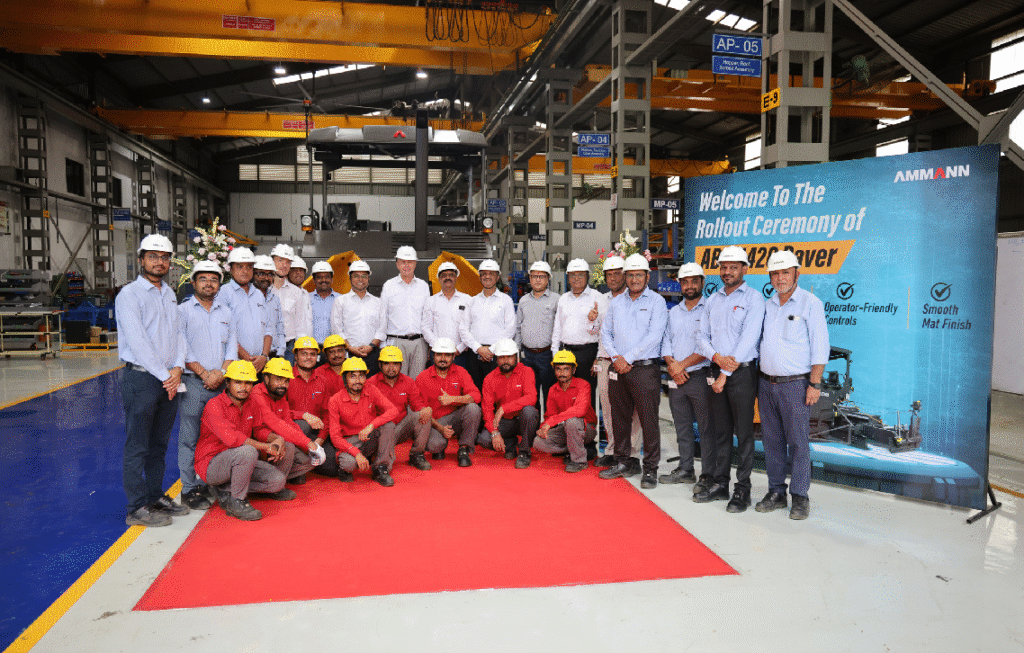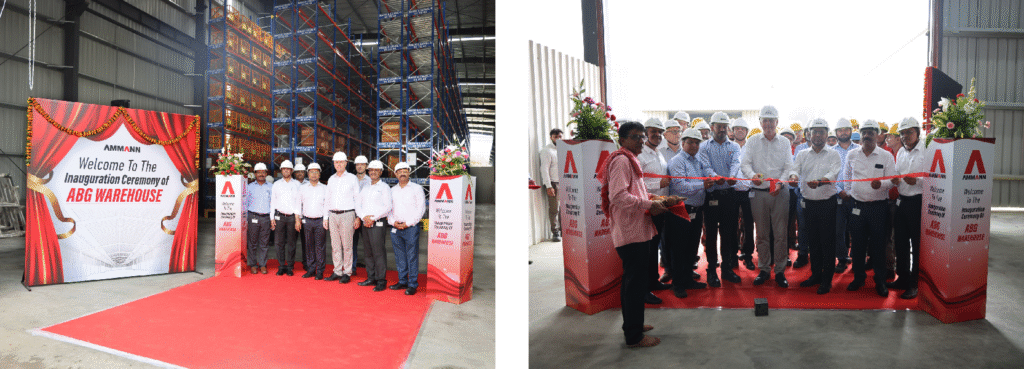Ammann India strengthens manufacturing and aftermarket capabilities with ABG Paver launch and high-Tech warehouse
in Gujarat
Ammann India delivers first ABG Paver and enhances service infrastructure
Ammann India achieved a significant milestone in its growth and integration journey with the successful roll-out of its first ABG Pave ABG 5420 Tracked Paver (Tier 3) from the newly commissioned assembly line at its state-of-the-art Ditasan manufacturing facility in Gujarat. This landmark event marks the completion of the ABG Paver business integration into Ammann India and reinforces the company’s commitment to the Government of India’s ‘Make in India for the World’ vision. The roll-out reflects Ammann’s strategic focus on localization, innovation, and delivering globally benchmarked road construction solutions from India.

The ceremonial launch was led by Mr. Bernd Holz, Executive Vice President, ABG General Management, and Mr. Dheeraj Panda, Managing Director, Ammann India, along with other senior leadership members. The Indian construction sector is undergoing rapid transformation, driven by major government-led infrastructure programs such as Bharatmala, PM Gati Shakti, and the Smart Cities Mission.
With the addition of the new facility, Ammann will be better positioned to cater to the growing demand for technologically advanced, fuel-efficient, and emission-compliant road construction machinery. The ABG 5420, compliant with Tier 3 emission standards, is well-suited to meet the needs of Indian contractors who prioritize performance, reliability, and sustainability in an increasingly regulated environment.
Simultaneously, the ABG 5420 Paver has been engineered to cater to international markets, especially in Southeast Asia, the Middle East, and Africa, as a strategic export base, bridging the global need for Tier 3-compliant, adaptable pavers at competitive pricing.
In the days ahead, more pavers for both domestic and foreign markets will be produced, putting the business in a position to cater to a wider range of clients in different geographic areas.
Ammann India additionally unveiled a dedicated ABG warehouse at the same Ditasan location, which is more than 10,000 square feet in size and has an extra 2,000+ square feet for material staging operations, adding to the day’s significance. Advanced material handling systems that can support up to 1,200 kg per shelf and a complex multi-level racking system with an 8-level stacking capacity for almost 1,800 SKUs are features of the facility. With its strategic layout intended for future growth and scalable operations, this warehouse greatly improves the company’s production requirements as well as aftermarket parts support capabilities for ABG products by offering quick parts availability, optimized material flow, shortened delivery times, and improved service response.
Speaking on the occasion, Mr. Dheeraj Panda Managing Director – Ammann India remarked, “The roll-out of the first ABG Paver from Ditasan and the commissioning of a dedicated warehouse are strong testaments to our commitment to localization, operational excellence, and customer service. These milestones will play a pivotal role in accelerating our ABG growth journey in India while boosting our capabilities as a global manufacturing and export hub.”

Both these announcements reinforce Ammann India’s strategic focus on manufacturing innovation, localized excellence, and customer-centric service infrastructure, enabling the company to serve both domestic and global markets with agility and precision.
Ammann India Private Limited, a subsidiary of the Swiss-based Ammann Group, is a leading manufacturer of advanced construction equipment. The company headquartered in Ditasan, Mehsana District, Gujarat, offers compaction equipment, high-performance asphalt and concrete mixing facilities, and pavers that are specifically designed to meet India’s infrastructure requirements.
Ammann India incorporates state-of-the-art road construction equipment to improve efficiency and environmental responsibility with an emphasis on innovation and sustainability. Its equipment ensures dependability and longevity while supporting large infra-structure projects including highways, roads, and airports.
To increase equipment uptime, the company also provides robust aftermarket support, which includes maintenance, training, and spare parts. Ammann India’s dedication to domestic production and support of national infrastructure projects strengthen its position as a reliable partner in the nation’s building industry.
Ammann India Private Limited
Web : www.ammann.com




